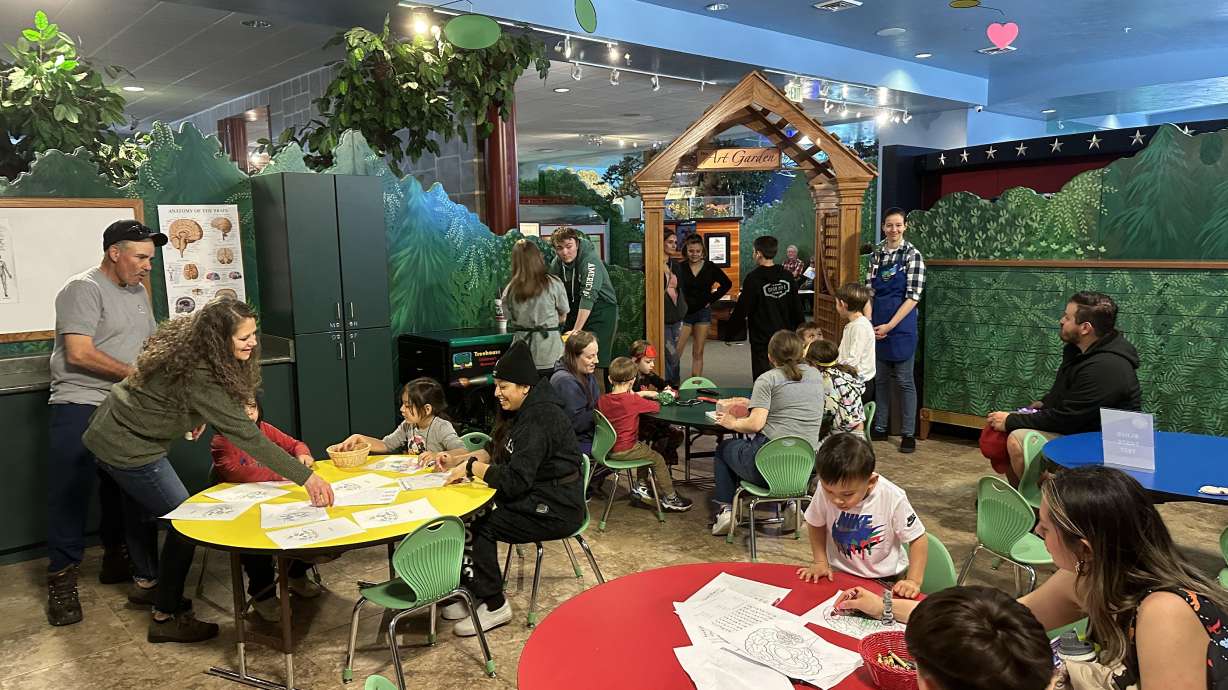Estimated read time: 3-4 minutes
This archived news story is available only for your personal, non-commercial use. Information in the story may be outdated or superseded by additional information. Reading or replaying the story in its archived form does not constitute a republication of the story.
OGDEN — Getting young children interested in complex learning subjects can be extremely challenging — yet, the Weber State University Neuroscience Club has found a way to engage hundreds of kids and pique their interest in the complex study of neuroscience.
"I got a comment card from a little boy from last year's event who said that he now wanted to become a neuroscientist. Before doing this event, I'd never heard of such a thing," said Aminda O'Hare, program director at Weber. For the last three years, university students have led hands-on workshops for young children to introduce them to the fascinating field of neuroscience and the study of the human brain.
Otherwise-complicated scientific concepts were taught to the Treehouse Museum's young guests through interactive activities, demonstrations and crafts. The Neuroscience Club's workshops give both kids and their parents an opportunity to understand the basics of brain science.
"Teaching young kids these concepts is super fun. I especially like being a resource for parents who might not know some things about the brain or are concerned about their own child's development," O'Hare said, adding that it is also rewarding for the students helping to run WSU's neuroscience club to have the chance to serve their community and pass on the things they have learned.
One of the workshops was an interactive lecture explaining the importance of wearing a helmet to prevent traumatic brain injuries. O'Hare said many parents don't know that once a bike helmet experiences an impact or fall, its ability to protect a child's head is compromised and it should be replaced.
The WSU Neuroscience Club was able to give away 96 brand-new bike helmets to visitors, due to a donation from the Safe Kids Utah Coalition, an organization dedicated to preventing accidental childhood fatalities.
Participants also learned about the structure of the ear and how it relates to hearing, the anatomy of the brain and the exploration of how and why optical illusions trick our brains.
To illustrate the anatomy of the brain, the Neuroscience Club displayed dissected sheep brains. To prove the complexity of our body's ability to taste, the students led visitors in blind taste tests in which they were blindfolded and had their noses blocked to demonstrate the importance of the other senses in how they allow us to taste food. And, doubling as a fun arts-and-crafts activity and as an opportunity to create a keepsake, visitors were shown how to make "neurons" out of beads and pipe cleaners.
"It's a great introduction to science for the kids," said Benson Bush, the club secretary. "We try and design the workshops around the kids and make it so that they can understand these concepts."
WSU's Neuroscience Club has prioritized community outreach to kids, having spent the university's spring break this year traveling to local elementary schools and holding similar demonstrations to hundreds of kids. Both the members of the club and O'Hare agree that giving the students an opportunity to pass on the things they've learned in the classroom benefits their own educational experiences. It tests their ability to process and repackage the intricate concepts they've learned for a younger audience.
"There's an old adage in teaching that says the best way to learn about something is to teach it to someone who doesn't possess the depth of knowledge that you have," O'Hare said. "Essentially, the students have to learn how to explain a super complex organ in a way that's accessible and easy for the kids and parents to understand — it really enhances their understanding of neuroscience to get them to the level where they are comfortable with teaching others."








